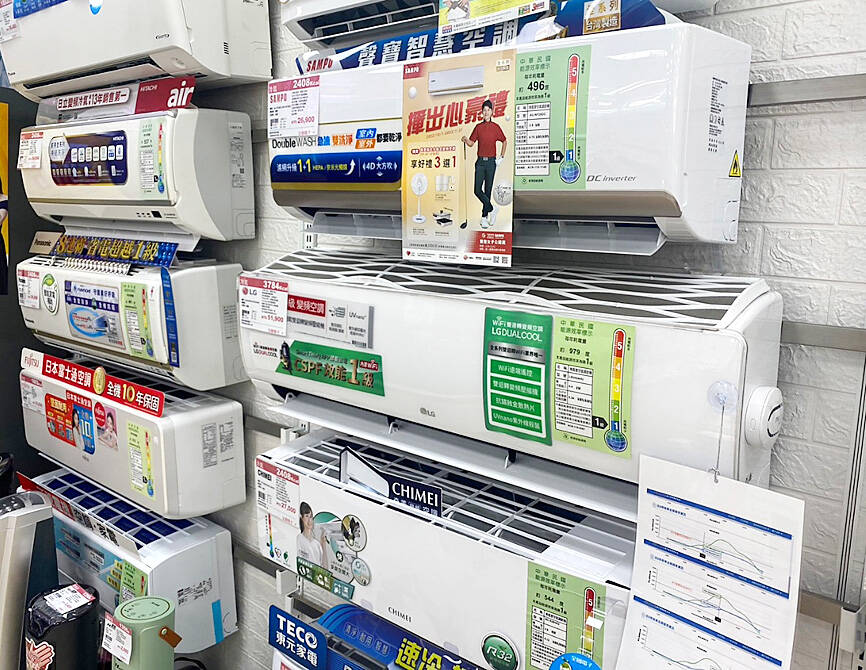The Ministry of Economic Affairs has allotted an additional NT$3.3 billion (US$106.82 million) for its program subsidizing purchases of energy-saving air-conditioners and refrigerators after demand outpaced this year’s budget, an official at the ministry said yesterday.
The program’s NT$8 billion budget was originally intended to help families exchange their old appliances for ones with the Grade 1 energy label over four years beginning this year, the official said.
Air-conditioners and refrigerators were targeted as they consume the most energy in households.

Photo courtesy of Taichung Economic Development Bureau
The program was meant to spend NT$2 billion per year, but that allotment was used up in late May and early last month, which led to revisions of the budget, they said.
Under the revised plan, the government would allocate an additional NT$3.3 billion to fund the replacements for the remainder of this year, with NT$2 billion for next year and NT$700 million for 2025, they said, adding that the budget’s total sum remained unchanged.
This means more money was available for this year, while decreasing the program’s duration, which probably would not affect outcomes as comparable energy schemes typically achieved the greatest success in their first year, the official said.
A previous iteration of the appliance replacement scheme ran into the same problem in 2019, compelling the ministry to change the budget plan, they said.
The NT$2 billion already spent was estimated to have replaced 640,000 appliances and probably saved up to 383 gigawatt-hours this year, they said.
The new funding means that an additional 1.7 million of the energy-wasting alliances could be replaced, increasing total energy savings to more than 1 terawatt-hours this year, the official said.
The extra money would be sourced from the ministry-controlled Petroleum Fund, they said.

The Taiwanese passport ranked 33rd in a global listing of passports by convenience this month, rising three places from last month’s ranking, but matching its position in January last year. The Henley Passport Index, an international ranking of passports by the number of designations its holder can travel to without a visa, showed that the Taiwan passport enables holders to travel to 139 countries and territories without a visa. Singapore’s passport was ranked the most powerful with visa-free access to 192 destinations out of 227, according to the index published on Tuesday by UK-based migration investment consultancy firm Henley and Partners. Japan’s and

NATIONAL SECURITY THREAT: An official said that Guan Guan’s comments had gone beyond the threshold of free speech, as she advocated for the destruction of the ROC China-born media influencer Guan Guan’s (關關) residency permit has been revoked for repeatedly posting pro-China content that threatens national security, the National Immigration Agency said yesterday. Guan Guan has said many controversial things in her videos posted to Douyin (抖音), including “the red flag will soon be painted all over Taiwan” and “Taiwan is an inseparable part of China,” while expressing hope for expedited “reunification.” The agency received multiple reports alleging that Guan Guan had advocated for armed reunification last year. After investigating, the agency last month issued a notice requiring her to appear and account for her actions. Guan Guan appeared as required,

Japan and the Philippines yesterday signed a defense pact that would allow the tax-free provision of ammunition, fuel, food and other necessities when their forces stage joint training to boost deterrence against China’s growing aggression in the region and to bolster their preparation for natural disasters. Japan has faced increasing political, trade and security tensions with China, which was angered by Japanese Prime Minister Sanae Takaichi’s remark that a Chinese attack on Taiwan would be a survival-threatening situation for Japan, triggering a military response. Japan and the Philippines have also had separate territorial conflicts with Beijing in the East and South China

A strong cold air mass is expected to arrive tonight, bringing a change in weather and a drop in temperature, the Central Weather Administration (CWA) said. The coldest time would be early on Thursday morning, with temperatures in some areas dipping as low as 8°C, it said. Daytime highs yesterday were 22°C to 24°C in northern and eastern Taiwan, and about 25°C to 28°C in the central and southern regions, it said. However, nighttime lows would dip to about 15°C to 16°C in central and northern Taiwan as well as the northeast, and 17°C to 19°C elsewhere, it said. Tropical Storm Nokaen, currently